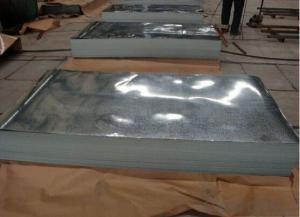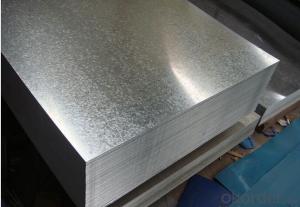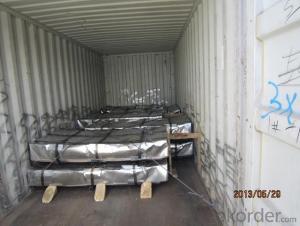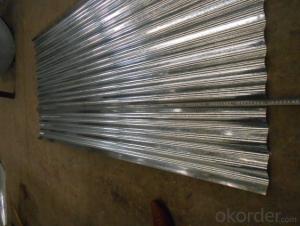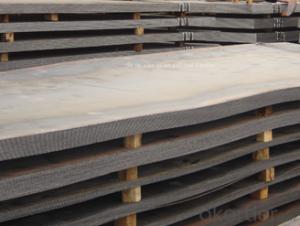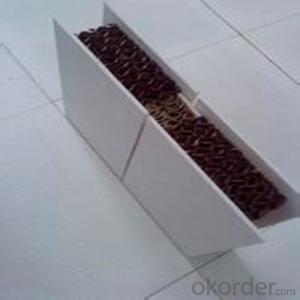High Quality of Galvanized Steel Sheet from China
- Loading Port:
- Shanghai
- Payment Terms:
- TT OR LC
- Min Order Qty:
- 50 m.t.
- Supply Capability:
- 5000 m.t./month
OKorder Service Pledge
OKorder Financial Service
You Might Also Like
1. Hot-Dip Galvanized Steel Coil Description:
Hot-dip galvanized steel coil are available with a pure zinc coating through the hot-dip galvanizing process. It offers the economy, strength and formability of steel combined with the corrosion resistance of zinc. The hot-dip process is the process by which steel gets coated in layers of zinc to protect against rust. It is especially useful for countless outdoor and industrial application.
2.Main Features of the Hot-Dip Galvanized Steel Coil:
• Excellent process capability
• Smooth and flat surface
• Workability, durability
• Excellent heat resistance performance
• High strength
• Good formability
• Good visual effect
3.Hot-Dip Galvanized Steel Coil Images
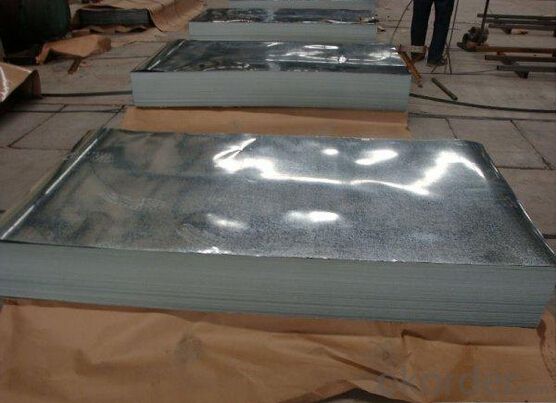
4.Hot-Dip Galvanized Steel Coil Specification
Standard: AISI, ASTM, BS, DIN, GB, JIS
Grade: SPCC, SPCD, Q195, DX51D
Thickness: 0.15-5.0mm
Model Number: coil
Type: Steel Coil
Technique: Cold Rolled
Surface Treatment: Galvanized
Application: Container Plate
Special Use: High-strength Steel Plate
Width: 600-1250mm
Length: depends
commodity: hot dipped galvanized steel coil
technique: cold rolled
thickness: 0.15-5.0mm
width: 600-1500mm
surface treatment: galvanized
zinc coating: 50-275g/m2
coil weight: 3-7 tons
coil ID: 508/610mm
spangle: zero spangle, regular spangle, small spangle, big spangle
payment term: by L/C or T/T
5.FAQ of Hot-Dip Galvanized Steel Coil
What’s the application of this product?
There are many applications for this product. For example, roofing, cladding, decking, tiles, sandwich walls, etc.
What’s the coating composition of Hot-Dip Galvanized Steel Coil?
The coating composition is 55% aluminium in weight ratio, 43.4% zinc, and 1.5% silicon, with excellent corrosion and heat resistance performance.
- Q:Are steel sheets suitable for high-vibration environments?
- Due to their inherent strength and durability, steel sheets are commonly used in high-vibration environments. Steel possesses excellent mechanical properties, such as high tensile strength and resistance to fatigue, making it capable of withstanding vibrations without significant deformation or failure. Additionally, steel sheets possess the ability to absorb and dissipate vibrations due to their mass and stiffness. This feature enables them to effectively reduce the transmission of vibrations to other components or structures. By absorbing and dissipating the energy generated by vibrations, steel sheets minimize the potential for damage or disruption. Moreover, steel sheets can be customized and produced to meet specific requirements for high-vibration environments. They can undergo reinforcement or be treated with coatings to enhance their resistance to corrosion, wear, and fatigue, thus further enhancing their suitability for such conditions. However, it is crucial to carefully consider the specific characteristics and intensity of the vibration environment when determining the compatibility of steel sheets. Factors such as frequency, amplitude, and duration of vibrations need to be taken into account. In extreme cases, alternative materials or specialized designs may be necessary to ensure optimal performance and longevity. In conclusion, steel sheets are generally well-suited for high-vibration environments due to their strength, durability, and vibration-dampening capabilities. Nonetheless, a comprehensive evaluation of the specific conditions is essential to determine the most appropriate solution for each application.
- Q:What are the different grades of steel sheets available?
- There are several grades of steel sheets available, each with its own unique properties and uses. Some of the commonly used grades include: 1. Carbon Steel: This is the most common and widely used grade of steel sheet. It contains varying amounts of carbon and is known for its strength and durability. Carbon steel sheets are used in a wide range of applications, including construction, automotive, and manufacturing. 2. Stainless Steel: This grade of steel sheet contains high levels of chromium, which provides excellent corrosion resistance. Stainless steel sheets are commonly used in industries such as food processing, chemical, and medical, where resistance to corrosion is crucial. 3. Galvanized Steel: This type of steel sheet is coated with a layer of zinc to protect it from corrosion. Galvanized steel sheets are often used in outdoor applications, such as roofing, fences, and gutters, where exposure to moisture and the elements is common. 4. Alloy Steel: This grade of steel sheet is made by adding other elements, such as manganese, nickel, or chromium, to improve its mechanical properties. Alloy steel sheets are commonly used in applications that require high strength, such as construction equipment, aircraft parts, and machinery. 5. Tool Steel: This grade of steel sheet is designed to have high hardness and wear resistance, making it suitable for use in tools and dies. Tool steel sheets are commonly used in industries such as automotive, aerospace, and manufacturing. It's important to note that these are just some of the grades of steel sheets available, and there are many more specialized grades tailored for specific applications. The choice of grade depends on factors such as the required strength, corrosion resistance, and specific application requirements.
- Q:Are the steel sheets magnetic?
- Yes, steel sheets are magnetic.
- Q:Are the steel sheets resistant to UV radiation?
- Generally, steel sheets are resistant to UV radiation. Steel, being a highly durable material, can endure exposure to different environmental factors, including UV radiation. However, the level of resistance may differ depending on the specific type of steel and its protective coating. Steel sheets with a superior protective coating, such as galvanized or stainless steel, exhibit greater resistance to UV radiation compared to bare steel. These coatings act as a barrier, preventing direct impact of UV rays on the steel surface and reducing the chances of degradation or discoloration. Moreover, regular maintenance and proper care can further bolster the steel sheets' resistance to UV radiation, ensuring their long-term durability and performance.
- Q:What does "Z" mean to the performance of steel?
- To apply for Z steel plate thickness and subjected to tensile load on just the thickness direction has the performance requirements, it is in a certain level of structural steel (called parent steel) on the basis of the special treatment (such as calcium treatment, vacuum degassing, argon stirring etc.) and proper heat treatment steel.
- Q:What is the standard size of a steel sheet?
- The standard size of a steel sheet can vary depending on the specific application and industry. However, in general, steel sheets are commonly available in standard sizes such as 4 feet by 8 feet (1.2 meters by 2.4 meters) or 5 feet by 10 feet (1.5 meters by 3 meters). These dimensions are widely used in construction, manufacturing, and fabrication processes. It is important to note that customized sizes can also be obtained based on the requirements of a particular project or customer.
- Q:How can the steel plate of flat welding 10mm make its deformation smaller?
- The most simple way is to set up a few blocks in the weld transverse positioning plate, welding seam after cooling in the two side gently hammering stress relief force dismantled.
- Q:How do steel sheets perform in vibration and noise reduction?
- Steel sheets are effective in vibration and noise reduction due to their high density and stiffness. They have the ability to absorb and dampen vibrations, minimizing the transmission of noise and creating a quieter environment.
- Q:How do steel sheets perform in high-humidity environments?
- Due to their inherent properties, steel sheets typically exhibit excellent performance in environments with high humidity. Steel is renowned for its strength, durability, and resistance to corrosion, rendering it a suitable material for enduring conditions characterized by excessive moisture. In certain materials, the presence of high humidity can result in the development of condensation on surfaces, thereby accelerating the corrosion process. However, steel sheets are often endowed with protective layers such as zinc or other corrosion-resistant coatings. These coatings function as a barrier against moisture, effectively preventing the onset of rust. Moreover, steel sheets are frequently subjected to galvanization or treatment with specialized coatings like stainless steel or weathering steel. These measures serve to enhance their resistance to humidity and forestall degradation over time. By providing an additional layer of protection, these coatings ensure that steel sheets retain their structural integrity and continue to perform well even in environments with high humidity. It is worth emphasizing that while steel naturally possesses resistance to moisture, the implementation of proper maintenance and care remains crucial to ensure its long-term performance. Regular inspections, cleaning, and the application of suitable sealants or coatings, if necessary, can further fortify steel sheets against the challenges of high humidity. In conclusion, steel sheets are generally well-suited for high-humidity environments due to their strength, durability, and corrosion resistance. Through the application of appropriate coatings and diligent upkeep, steel sheets can uphold their performance and structural integrity even in conditions characterized by an abundance of moisture.
- Q:What is the average cost of steel sheets compared to fiberglass?
- The average cost of steel sheets is generally higher compared to fiberglass sheets.
1. Manufacturer Overview |
|
|---|---|
| Location | |
| Year Established | |
| Annual Output Value | |
| Main Markets | |
| Company Certifications | |
2. Manufacturer Certificates |
|
|---|---|
| a) Certification Name | |
| Range | |
| Reference | |
| Validity Period | |
3. Manufacturer Capability |
|
|---|---|
| a)Trade Capacity | |
| Nearest Port | |
| Export Percentage | |
| No.of Employees in Trade Department | |
| Language Spoken: | |
| b)Factory Information | |
| Factory Size: | |
| No. of Production Lines | |
| Contract Manufacturing | |
| Product Price Range | |
Send your message to us
High Quality of Galvanized Steel Sheet from China
- Loading Port:
- Shanghai
- Payment Terms:
- TT OR LC
- Min Order Qty:
- 50 m.t.
- Supply Capability:
- 5000 m.t./month
OKorder Service Pledge
OKorder Financial Service
Similar products
New products
Hot products
Related keywords
